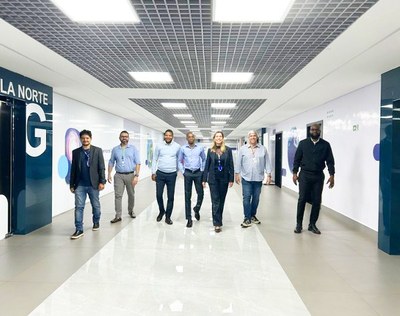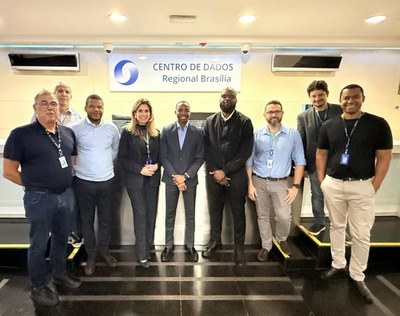Notícia
Business
Serpro and Angola advance in the modernization of the country’s public finances

Serpro, Brazil’s federal state-owned technology company, and the innovation and infrastructure team of the National Service for Information and Communication Technologies of Public Finances (SETIC-FP) of the Angolan Ministry of Finance are undertaking a 15-day immersion to deepen their strategic partnership, marking the third phase of the innovation consultancy signed in March this year.
The partnership is part of a broader cooperation agreement focused on modernizing Angola’s public sector. The main goal is to strengthen the country’s public finance systems through consultancy, knowledge transfer, and institutional reorganization. Building on an established collaboration, Serpro has been providing strategic guidance and technical expertise to SETIC-FP, sharing its extensive experience in innovation management, new product development, business model structuring, cybersecurity, digital resilience, data sovereignty, and certificate authority functions.
“With Serpro’s success and experience in connecting Government and society, through products based on core system information that help reduce public spending and provide more citizen-connected services, the Angolan Government selected us as consultants in this new phase of the country’s digital transformation. The object of this partnership is market intelligence and the use of one of our best assets: people. We analysed Angola’s current landscape and, together, mapped a route based on our errors and successes. This is a business opportunity for the company, with the possibility of supporting partner countries in advancing their digital transformation process,” said Felipe Lopes, Superintendent of Business Intelligence (Sunin).
“We analysed Angola’s panorama and mapped together a route based on our errors and successes.”
 Angolan Delegation
Angolan Delegation
The Angolan manager of the Unit of Innovation and Business Intelligence (UIIN), Maer Neto, and his team were hosted by the Manager for Analysis and Business Innovation Opportunity Modelling, Moziel Freire; the Manager of Business Opportunity Portfolio Management; and analysts André Nader and Tatiana Queiroz, all from Sunin.
Maer Neto stressed that Serpro’s innovation team has been working since the time the SETIC-FP innovation laboratory was established. “Now, we’re in the phase of designing the innovation process — from the suggestion of an idea through to product generation. For us, it is crucial not only to design an innovation process but also to experiment, because the innovation process must be adaptable and customisable to our reality. In the end, we will manage the entire innovation cycle, from when an idea enters through to the production of products and services, to transform and generate value for the citizen,” he stated.
Specific Structure for Innovation
The work resulted in the creation of a specific structure for innovation. “We are in an immersion to really understand, as if hands-on, how all of Serpro’s infrastructure works. How we work with innovation and other issues, such as development and certificate authorities. The delegation will participate in this work. At the end of this immersion, the security specialists will likely be responsible for structuring SETIC’s certificate authority in Angola,” said Moziel Freire.
Meanwhile, Eliezer Trajano spoke about the dimension of this work for Angola’s digital transformation and what it represents for Serpro. “Our objective is to support the construction of this great Innovation Hub, a true space of creative freedom for Angolan talent. All our experience and the success of the methodologies tested and applied here are being shared. We believe this Hub will be the ignition point for the next generation of Angolan products and services, redefining the digital landscape in the country. For Serpro, it is an honour to help the digital transformation process in Angola,” he emphasised.
Execution of the Consultancy
Tatiana Queiroz, an analyst in the Business Opportunity Portfolio Management area at Sunin, detailed what the Innovation Consultancy for Angola is, its stages, the results achieved, and the next steps in the entire process.
“The innovation consultancy’s mission is to support SETIC-FP in the structuring and operation of the Technology and Innovation Unit (UIIN) as a strategic nucleus for institutional transformation, articulating people, processes, technologies, and culture to develop solutions and new business models, including new revenue streams, aligned with the priorities of the Ministry of Finance,” said Tatiana Queiroz.
“Technically, this means structuring and positioning the ecosystem of this secretariat, instituting robust governance and processes, treating innovation as an institutional capacity that is stable, measurable, and scalable, capable of reducing lead time to increase reliability, sustaining the evolution of digital public-finance services, generating fiscal value, efficiency, and real impact for the Angolan citizen. The intended result is to make SETIC-FP the national reference in technology, including the transversal efforts of innovation,” she detailed.
Serpro’s mission, together with SETIC-FP, including its innovation consultancy, is anchored in the Government’s initiatives.AO 27 Agenda (interoperability, digital identity, security, data governance, capacity building, and sustainability). In addition, the innovation consultancy guides the UIIN’s portfolio and results to improve Angola’s performance in the Global Innovation Index (GII) of the World Intellectual Property Organization, through concrete steps. In summary, it positions the UIIN’s operations as one of the levers of SETIC-FP, connecting internal innovation capabilities and articulating the public finance ecosystem, with measurable economic and social results by 2027.
 Stages of the Innovation Consultancy and Its Results
Stages of the Innovation Consultancy and Its Results
The first stage was subdivided into two sub-stages: an institutional diagnosis of innovation and the structuring of the Minimum Viable Ecosystem (MVE). In the diagnosis, senior management’s perceptions of SETIC-FP’s digital-transformation agenda, what they understand by innovation, and their expectations of this work agenda at SETIC-FP were captured. Also analysed were perceptions about team engagement, respective barriers, opportunities, and predominant sentiments.
The consolidation applied qualitative content analysis (Mayring, 2014) through deductive categorization (with pre-defined categories: expectations, culture, barriers, innovation vision, human capital, services/client, coding and interpretation of convergences/dissents), complemented by sentiment analysis and a SWOT interpretative matrix. Then the MVE (Minimum Viable Ecosystem) was structured, defined as the smallest configuration of actors, capabilities, functions, governance, and infrastructure needed for an ecosystem to begin generating real value (measurable results) with low risk and high learning, according to the framework author Tatiana Queiroz of the InovaSunin team.
In a face-to-face workshop with SETIC-FP leadership, the Public Innovation Capacity Model, developed by Tatiana and awarded by the Brazilian Association for Public Administration – SBAP in 2024, along with the Public Innovation Ecosystem Orchestration Framework (co-authored by the same researcher), were applied to design the minimum ecosystem needed to generate results. The future vision and priority actions connected to strategic objectives were defined; the innovation capabilities required were identified and linked to the actors (internal and external); these actors were positioned in the ecosystem functions of SETIC-FP, and the quadruple helix (Public Sector, Private Sector, Academia, and Society) was articulated. The result is the self-declared and agreed-upon MVE SETIC-FP, which connects internal capabilities, external partnerships, and public-value generation, strengthening the Ministry of Finance’s innovative positioning.
Stage 2 focused on defining the UIIN’s operation, with emphasis on the innovation laboratory. Using the Public i-Labs Structuring Methodology (co-authored by Tatiana Queiroz), the strategic intent was consolidated, along with the innovation-management process, the macro-process, and the UIIN’s processes, to be formalised within SETIC-FP’s governance, in coordination with the Governance and Processes front. The stages, activities, inputs, and outcomes were detailed, along with management indicators and objective decision criteria by phase (gates), public value, viability, risk, and impact on the GII. The roles and responsibilities (UIIN, Innovation Committee, partner areas, and stakeholders of the quadruple helix) were established, and the physical and virtual spaces were specified. The initial portfolio and operational artefacts were structured, and the high-impact pilot projects with the Diope teams. The result is a complete operational model that enables SETIC-FP to run, measure, and scale innovation as an institutional capacity, connecting rapid results of POCs/MVPs to the 2027 vision.
In Stage 3, currently underway, the process is being refined by executing POCs (Proofs of Concept) that validate the i-Lab model and the Innovation Management Process end-to-end. In parallel, the MVE (Minimum Viable Ecosystem) is being reviewed in the light of identified capabilities in organisational processes, with roles, responsibilities, deliverables, and indicators defined. The Innovation Committee has been established, and the legal-normative basis for the future Innovation Policy of SETIC-FP has been initiated.
The UIIN’s visit to SERPRO includes immersion in innovation teams, getting to know them, and understanding, in practice, how innovation-management processes interlink.
Next Steps
The following steps are to conclude the POCs to calibrate Version 1 of the innovation process and update the MVE with the identified capabilities; formalise governance (Innovation Committee, roles, indicators) and initiate SETIC-FP’s Innovation Policy (legal basis, draft and legal validation).
In parallel, efforts will focus on structuring the UIIN/i-Lab capability roadmap, launching a program to boost entrepreneurship and scalability, and activating open innovation in partnership with universities, startups, and key sectors. By the end of the cycle, the goal is to scale the approved pilot projects and report key performance indicators (KPIs) reflecting public value and measurable progress toward the objectives of the Government Agenda.




